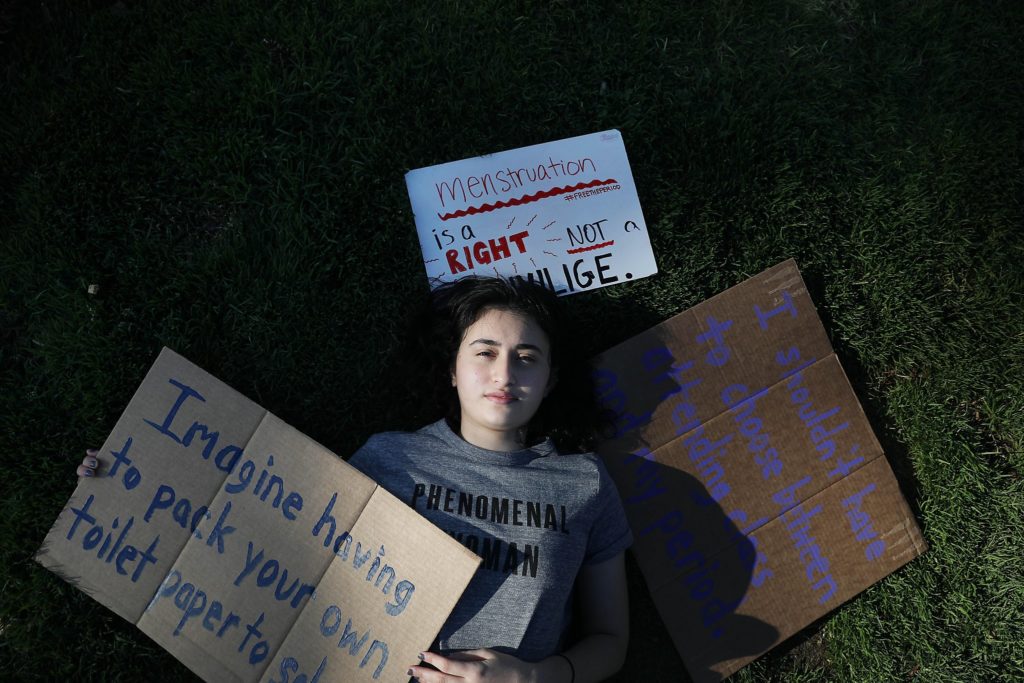Menstrual stigma is real. Period poverty is real. Feminine products are expensive, not always available, and often taxed as a “luxury” item rather than as a necessity. This financial reality is replicated in most countries and is often aggravated by outdated cultural beliefs that stigmatize menstruation and impose isolation and other punishments. These all impact the lives of women, especially young women, in real and detrimental ways. Among the most damaging – it keeps them out of school.
This is a worldwide issue, but it is a local teen, Amanda Safi, who specifically brought it to my attention and is the focus of this Women Who Inspire. Amanda, a graduate of Aragon High School in San Mateo and a current freshman at UC Santa Cruz, was aware of problems related to the affordability of period products throughout her high school years. She’d heard stories from classmates about girls leaving school or staying home when their periods began, missing class, tests, and extracurricular activities because of a lack of affordability and access.

“Period products are just as important as toilet paper, but our government and our schools still do not see our biology as worth the investment,” Safi told the San Francisco Chronicle. “We see toilet paper in bathrooms provided for free, but we don’t see period products in bathrooms, even though menstruation is necessary.”
Her anecdotal information is supported by statistics. Two-thirds of participants reported being unable to afford period products in a 2019 survey of low-income women. Other surveys have shown one in four and one in five women reporting lack of funds and/or access to menstrual products. There are physical and mental health consequences to period poverty, in addition to the negative effect on education.
After hearing the frustration and embarrassment of friends firsthand, Safi decided to take action. She started by surveying her peers on a formal level to gain a truer understanding of the issue and what would help. She worked with the nonprofit group Period, learning how to develop a proposal and contact government officials to affect change. The pandemic disrupted her schoolyear and work briefly, but also exacerbated the problem, as it has so many others, and made Safi’s work even more timely and important.
Safi’s proposal sought funding to provide free products in schools and proposed a plan to do so even, perhaps especially, while schools are closed during the pandemic. She brought her idea to her principal, and then to several local officials, eventually working with State Rep. Jackie Speier and San Mateo councilor Carole Groom to present Period Equity Project, asking for a $20,000 grant to fund a 2-year pilot program. Rep. Speier plans to provide $5,000 to run the pilot at Jefferson High School in her district.
On Tuesday, February 9th, the San Mateo County Board of Supervisors voted to approve the grant and the program will begin soon – in fact it may be underway by the time you read this. Congratulations Amanda!
Amanda is one important woman among many fighting for menstrual justice. Period, the organization that helped Amanda learn the ropes, works with youth chapter members, nonprofit and community organizations, and corporate and other sponsors across the U.S. and in more than 35 countries to fight period poverty. Women are demanding change and getting results, just like Amanda.
In October 2020, Scotland became the first country to require free menstrual products be provided for women, not just students. In February, Prime Minister Jacinda Ardern announced that schools in New Zealand will offer menstrual products to all students beginning in June 2021. In the U.S., women are working for change in the 35 states that still tax feminine products, improving availability in schools, and continuing to fight for more ambitious changes for equality in public spaces.
I think Amanda’s story is inspiring in a number of ways. First, it reminds me that an equitable society is achieved on numerous levels and varied arenas. It’s critical to create equality in all areas of life. Without equal and dignified access to the basic necessities of life, workplace equality seems irrelevant.
Second, seeing Amanda take individual, local action to solve a problem reminds me that we all have the power to change our world because “our” is both small and big, local and global, individual and collective. Individual efforts can have important results – improving the lives of a few is worthwhile on its own and can lead to more collective action. You may start out as just one person, but there are others waiting to be inspired by your effort and join you in creating a solution. Amanda’s success shows us that.
Finally, it is a reminder for us all that everyone must demand and work for fairness in society, and not just in the workplace. Of course, corporations and business owners need to look internally and figure out what is necessary to ensure diversity, equality, and inclusion at their company, but we also need to look outward and do what is necessary to address and end discrimination and inequality wherever it is occurring. Amanda’s efforts to end period poverty inspire me. She reminds me that we can, and must, address the problems in our society. Individually we can take action that collectively helps our society work for all of us. Thanks, Amanda!
Who inspires you to make a difference in your community? Reach out and let us know!
Related Articles:
